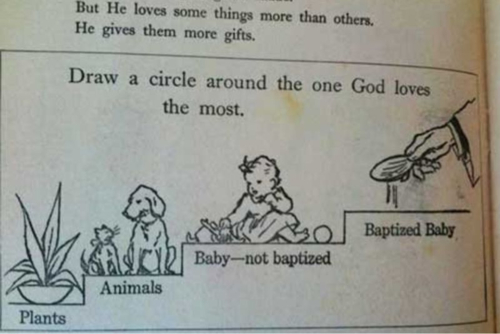Recently I wrote a post on the All About Eve blog that the theological invitation “Believe in Jesus for eternal life” is more concretely summed up with the statement “God loves you.”
I wrote that many people have trouble understanding what it means to believe in Jesus for eternal life. And while this invitation is referred to over and over in the Gospel of John (e.g., John 3:16; 5:24; 6:47), this offer of eternal life is often equated with the fact and foundation of God’s love for humanity.
So I believe that if we really understand God’s love for us, we will have also understood that He gives us eternal life freely through Jesus Christ.
Therefore, when someone says, “I don’t know if I have believed enough, or believed the right thing,” one way to help people sort through this is to ask if they know that God loves them.
 And I mean REALLY loves them. No conditions. No limits. No ifs, ands, or buts.
And I mean REALLY loves them. No conditions. No limits. No ifs, ands, or buts.
This sort of understanding of God’s love is so radical, it revolutionizes everything we think about God, Scripture, ourselves, and the church.
Understanding that God loves you infinitely and completely no matter what you have done in the past or what you do in the future, whether you change or not, this is equivalent to understanding that God gives you eternal life freely by His grace.
This sort of teaching about love is what grants people freedom from sin, freedom from religion, and freedom from fear.
I have previously written about this on numerous posts in numerous ways.
But here’s the thing that I have come to realize in the last couple of days:
The church has bastardized the biblical concept of love.
I doubt you could find a church in the world which does not preach the message that “God loves you.” But so few churches and Christians actually understand it or believe it.
Yet rather than try to fight this misunderstanding about love, I think might be best to start saying something else instead.
Rather than saying “God loves you” to people, maybe we should start saying “God likes you.”
Yes, yes, I know. “Like” is a much weaker word than “love.” But there are countless millions of people who would agree in a second that God loves them, but who do not for a second believe that God likes them.

To understand what I’m talking about, let’s back up a bit. In Christian circles, it is not uncommon to hear someone say this: “I love my neighbor … but I don’t like them.” Or maybe instead of your neighbor, you have said this about an in-law, the church gossip, or a rude deacon.
When we say we love someone but don’t like them, we mean this: “I love them (because I know I am supposed to), but I don’t want to hang out with them or be their friend.”
This sort of idea is often preached in our pulpits as well. Again, you will sometimes hear pastors say this: “As Christians, we are supposed to love everybody, just as God loves us. But even though you love them, you don’t have to like everything about them. Remember, we love the sinner and hate the sin!”
Do you see? We have this attitude toward others because we think this is God’s attitude toward us. We think God loves us, but doesn’t really like us. At least, He doesn’t like us the way we are now. He likes some future version of us where we have cleaned up our lives, gotten rid of sin, read our Bibles and pray more faithfully, and witnesses regularly to our friends and neighbors. That future “fixed” person is the one God wants to be friends with and hang out with; not the “broken” and sinful person we are now.
So you see? Though we believe God loves us, we don’t really think He likes us.
But here is the Gospel truth as revealed in Jesus Christ: GOD LIKES YOU!
Let me bring this down to earth a little bit more.
Think of a famous author, actor, or musician you would love to be friends with.
For me, I think of people like N. T. Wright, Brad Paisley, and Keanu Reeves. I think it would be awesome to be best friends with these guys. You know … to have such a good friendship that it became informal … that they just drop by my house to see what’s going on, and I could do the same for them. It would be assumed that we watch football together on Monday nights. That when we went camping, we would invite the other along. That if we just wanted to chat about life and theology, we would call up the other person first.
Do you have someone in mind who is like that? Someone you would love to get to know, hang out with, and have “inside jokes” with?
 Usually, when we think about God, we tend to put God in the place of these famous people we want to know. We think, “It would be so cool if God and I were on a first-name basis. If I could call God any time I wanted. If we could hang out like best friends.”
Usually, when we think about God, we tend to put God in the place of these famous people we want to know. We think, “It would be so cool if God and I were on a first-name basis. If I could call God any time I wanted. If we could hang out like best friends.”
But here is the actual truth: When God thinks about you, He thinks about you the way you think about the famous people you want to know. The way I think about being friends with N. T. Wright, Brad Paisley, and Keanu Reeves, that is how God thinks about me.
God likes me so much, He dreams about being on a first-name basis with me! He dreams about hanging out with me to watch a football game. He dreams about just showing up at my house with no other purpose than to say, “What’s happening?”
And this is the same way God feels about you.
More than anything else, He wants to hang out with you. He wants to be your friend. You are the famous person He would “name drop” to all the angels when He talks about what He did over the weekend. More than anything, God wants to be on a first-name basis with you. He wants to be the one you think of calling when things are going great, and the one you call when things are going bad.
God likes you so much, He wants to even hang out with you when you are weeding your garden, filling your car with gas, and running errands to Sears.
And best of all, God likes you just as you are. He doesn’t want to be friends with some “better and improved” version of you. He wants to be friends with you … as you are right now.
God likes YOU.
This is the truth about God that many people do not believe and cannot accept. They cannot believe that the God of the universe is so madly in love with them, so infatuated with them, so in awe of who they are and what they like and the sorts of things they do, that He would “like” every single one of your Facebook posts, would “Favorite” every single Tweet, and would “Repin” every single picture on Pinterest.
God is your biggest fan, and He dreams of just being in your presence.
God likes you.
This is the Gospel message. This is what Jesus came to reveal.
Do you believe this?








 One of the key sections of A More Christlike God is where Brad Jersak discusses the all-important issue of “the wrath of God.” This idea is found in numerous places in the Bible, and is one of the key issues in this debate about what God is like. Many people assume that the phrase “the wrath of God” indicates that God is angry at us. Jersak presents a compelling case for why this is not a proper understanding of that term. He rightly critiques the idea that “the wrath of God” is God withdrawing His mercy. God never withdraws His mercy. God’s mercy is unfailing and everlasting. His mercy endures forever (Psalm 136).
One of the key sections of A More Christlike God is where Brad Jersak discusses the all-important issue of “the wrath of God.” This idea is found in numerous places in the Bible, and is one of the key issues in this debate about what God is like. Many people assume that the phrase “the wrath of God” indicates that God is angry at us. Jersak presents a compelling case for why this is not a proper understanding of that term. He rightly critiques the idea that “the wrath of God” is God withdrawing His mercy. God never withdraws His mercy. God’s mercy is unfailing and everlasting. His mercy endures forever (Psalm 136).
 I listened to a sermon today in which the preacher (I’m not going to call him a pastor) said these things:
I listened to a sermon today in which the preacher (I’m not going to call him a pastor) said these things:

